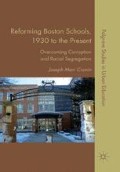Abstract
Boston business leaders early in the twentieth century won substantial control over the Boston schools for the decade 1906 until 1915. Businessman James Jackson Storrow and Superintendent Stratton Brooks managed the Boston school system like a corporation.1 But business dominance over Boston ward politics did not survive the decade. For the next sixty years, politicians ran the schools as a public employment “jobs” system. Was it possible for Boston’s business leaders in the 1970s to reverse the tide and make schools respond to the needs of children, parents, and employers? Was the desegregation suit a detriment, or stimulus to corporate participation and voice?
Access this chapter
Tax calculation will be finalised at checkout
Purchases are for personal use only
Preview
Unable to display preview. Download preview PDF.
Notes
Henry G. Pearson, Son of New England: James Jackson Storrow (Boston, 1932), 43–59, 66–68.
Michael Porter, Rebecca Wayland, and C. Jeffrey Grogan, Toward a Shared Economic Vision for Massachusetts, Boston, Secretary of State, 1992.
Dentler and Scott, Schools on Trial (Cambridge, 1981), 34.
Betsy Useem, Low Tech Education in a High Tech World (New York, 1986)
For example, the Detroit Compact, discussed in Jeffrey Mirel’s The Rise and Fall of Detroit Schools 1907–1981 (Ann Arbor, 1999), 499.
Report of the Mayor’s Advisory Committee on School Reform, The Rebirth of America’s Oldest Public School System: Redefining Responsibility (City of Boston, May 1, 1989). See its Appendix on Boston Public School performance trends.
Massachusetts Business Alliance for Education, Every Child A Winner, 1991.
Boston Plan, Partnership Report, September 2005.
Patricia A. Graham, SOS: Sustain Our Schools (New York, 1993).
Copyright information
© 2008 Joseph Marr Cronin
About this chapter
Cite this chapter
Cronin, J.M. (2008). Business Calls for Educational Improvements. In: Reforming Boston Schools, 1930 to the Present. Palgrave Studies in Urban Education. Palgrave Macmillan, New York. https://doi.org/10.1057/9780230611092_9
Download citation
DOI: https://doi.org/10.1057/9780230611092_9
Publisher Name: Palgrave Macmillan, New York
Print ISBN: 978-0-230-11145-5
Online ISBN: 978-0-230-61109-2
eBook Packages: Palgrave Social & Cultural Studies CollectionSocial Sciences (R0)

